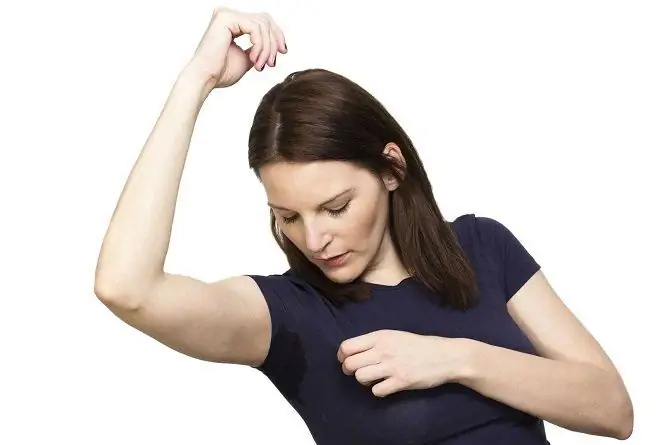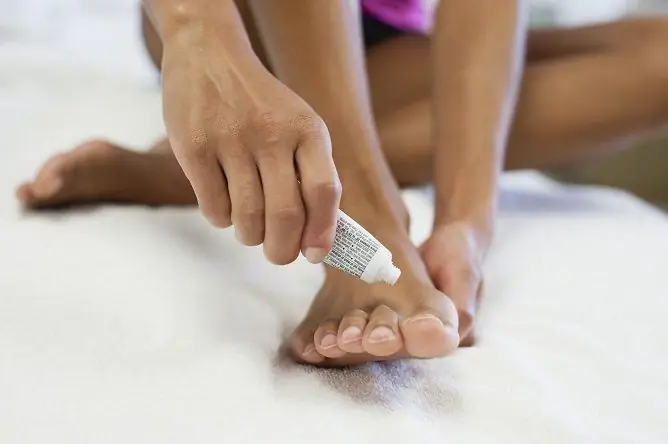- Author Rachel Wainwright wainwright@abchealthonline.com.
- Public 2023-12-15 07:39.
- Last modified 2025-11-02 20:14.
Drugs for menopause from hot flashes and sweating: non-hormonal, hormonal, folk remedies
The content of the article:
-
What is menopause
Menopause symptoms
-
Why do hot flashes occur during menopause
What is the danger of hot flashes
-
How to reduce flushing and excessive sweating
- Diet during menopause
- Drinking regime
- clothing
- Medical antiperspirants
- Exercise stress
- Diagnosis of hyperhidrosis
-
The best remedies for menopause for hot flashes and sweating
- Hormonal drugs
- Non-hormonal drugs
- Traditional medicine
- Video
Drugs for menopause from hot flashes and sweating help to make this period less uncomfortable for a woman, both physiologically and psychologically. Menopause is a natural process during which there is a change in hormonal levels and the extinction of reproductive function, which affects the whole body.

One of the main symptoms of menopause is excessive sweating and hot flashes.
Timely detection of the onset of hormonal imbalance, confirming in the analyzes in the form of a slight decrease in the production of estrogen by the ovaries, allows taking appropriate measures and alleviating the patient's condition during the entire period of restructuring.
What is menopause
The period of menopause is characterized by the appearance of deep wrinkles on the face, sagging skin, rapid weight gain, burning sensation and dryness in the vagina, the development of depression, apathy, panic, aggressiveness, distraction and irritability.

Hormonal changes are associated with a decrease in estrogen levels
All these changes are associated with a decrease in the level of sex hormones - estrogen and progesterone. The period preceding this process - pre-menopause, is usually asymptomatic, so women often do not see the point in seeking medical help.
Menopause symptoms
To compensate for the deficiency of sex hormones, patients 45-55 years old are prescribed special medications, the intake of which allows to prevent such negative consequences as:
- sleep disorders;
- rapid aging, manifested by a deterioration in the structure and appearance of nails, hair and skin;
- irritability and depression;
- decreased libido and vaginal dryness;
- disorders of urination;
- hot flashes, accompanied by increased sweating (hyperhidrosis) even at night and palpitations.

Skin and hair condition worsens during menopause
In cases of severe menopause, along with these phenomena, severe cardiovascular pathologies, hypertension and osteoporosis can also develop. Given the possible complications, the need for the use of special drugs in combination with vitamin therapy, daily physical activity, proper nutrition and weight control is increasing.
The postmenopausal period usually falls at the age of 55-60 years and is characterized by the completion of hormonal changes in the body. From this moment, the woman ceases to be nervous and depressive, notes the complete subsiding of the symptoms of the climacteric period that bring physical and psychological discomfort.
Why do hot flashes occur during menopause
Against the background of hormonal changes in women, there are disorders in the functioning of organs and systems, an imbalance of autonomic reactions, as well as changes in thermoregulation processes.
The lack of hormone for the brain becomes a signal of overheating of the body, which actually does not happen. In response to such false signals, the body tries to normalize thermoregulation - sweat is released, the heart rate increases, blood vessels expand, a wave of heat appears throughout the body and the skin turns red.
On average, the duration of such an attack varies from 10-15 seconds to several minutes, and at the end of the attack may be severe chills.
What is the danger of hot flashes
The severity of menopause is determined based on the number of hot flashes, namely:
| Severity | Characteristic |
| Easy | Celebrated up to 10 episodes per day |
| Average | Fixed from 10 to 20 hot flashes per day, as well as a decrease in working capacity |
| Heavy | The number of episodes per day exceeds 20, against the background of this, a persistent loss of working capacity develops |
In addition to feeling hot, mood swings, decreased concentration, irritability, tearfulness, apathy, increased anxiety and memory impairment may also appear. In some cases, on the eve of the next episode, women experience tension, excessive agitation and panic, which causes nausea, dizziness and difficulty breathing.
The duration and frequency of hot flashes during menopause is a purely individual phenomenon. So, in some women, they begin several years before the onset of menopause and are noted for 10-15 years several times a day, while in others they occur extremely rarely and without pronounced symptoms.
How to reduce flushing and excessive sweating
When signs of menopause appear, you should seek advice from a gynecologist and endocrinologist. To relieve hot flashes, your doctor may recommend:
- drug therapy: their action is aimed at replenishing hormone deficiency;
- visiting a psychologist: this is effective in cases where the patient's psychological state is unstable;
- consultation with a nutritionist: it is necessary to correct the diet, work and rest.
To reduce the frequency and severity of attacks, it is recommended to exclude the factors that provoke their appearance and intensification. Patients should avoid overheating of the body, which can lead to a long stay outside on hot days, a visit to a bath or sauna.
Diet during menopause
Quitting alcohol, smoking, coffee, eating hot spicy fatty and sweet foods is no less important. Correcting your diet not only helps to reduce the severity of attacks, but also helps control weight.

To reduce the severity of hot flashes, it is necessary to make changes in the diet.
A woman's diet in menopause should mostly consist of fresh vegetables and fruits, cereals, nuts, lean meats and fish, chicken eggs and dairy products.
Drinking regime
It is recommended to consume at least 1.5-2 liters of pure water every day, because due to excessive sweating, the body quickly loses fluid, which is important to replenish in a timely manner to prevent rapid cell aging.
clothing
During menopause, it is important to give preference to clothing, underwear and bedding made from natural materials (linen, silk, cotton). An exception is clothing made of synthetic fleece, since it warms well in cold temperatures, dries quickly and effectively removes moisture from the body.
Medical antiperspirants
If there is an unpleasant odor that accompanies increased sweating, special medical antiperspirants, powders and topical creams can be used.

Deodorants and antiperspirants are used to eliminate sweat odor
Exercise stress
Regular physical activity with static sports such as callanetics, yoga, Pilates or stretching can help relieve tension and help reduce the severity of seizures.

Static sports for menopausal women
Diagnosis of hyperhidrosis
Before selecting drugs or traditional medicine to reduce the manifestations of menopause, the patient, in addition to being tested for hormones and tumor markers, undergoes a number of studies, namely:
- ultrasound examination of the pelvic organs;
- mammography;
- taking a smear from the vagina;
- blood clotting test;
- electrocardiogram;
- liver function tests;
- diagnostics of the liver and thyroid gland.
Based on the data obtained, the doctor determines whether there are concomitant chronic pathologies, and, taking into account the possible side effects, decides on the appointment of means and methods for relieving the symptoms of menopause.
The best remedies for menopause for hot flashes and sweating
Medicinal and herbal remedies used for this purpose include:
| Group | Characteristic | Names |
| Hormonal drugs (synthetic, combined) | The action of these funds is aimed at replenishing estrogen. After the first intake of hormones, the severity of hot flashes is significantly reduced, insomnia and mood swings pass, the process of premature aging stops | Klimonorm, Atarax, Grandaxin, Sigetin, Dermestril |
| Homeopathy, herbal estrogen medications | Such funds have a cumulative effect, so their action is not observed as quickly as in cases of taking hormonal medications. Phytoestrogens have a much milder effect on the body and do not cause serious side effects | Klimaksan, Remens, Klimaktoplan, Klimakt-Hel, Klimadinon, Inoklim |
| Peptide based preparations | The action of peptide agents is aimed at smoothing out the signs of menopause, regulating the neuroendocrine system, improving the functioning of the genitourinary system and hormonal status | Endoluten, Zhenoluten, Kartalax, Sigumir |
| Vitamins, minerals | Complexes of vitamins and minerals contain optimal doses of biologically active substances, macro- and microelements necessary to restore cells, accelerate metabolism, improve blood circulation in tissues and normalize the psychological background | Menopace, Vitatress, Femikaps, Alphabet 50+, Estrovel, Klimadinon Uno |
| Medicinal plants | Raw materials of medicinal herbs for menopause are used externally for baths, as well as orally in the form of infusions and decoctions. The composition of plants includes biologically active substances that, with regular use, are able to normalize hormonal levels, improve blood circulation in tissues and restore normal levels of estrogen | Cimicifuga racemosis, linden, nettle, red brush, yam root, soy, passionflower incarnate, valerian, mint, ginseng, sage |
Hormonal drugs
Hormonal drugs, according to doctors and patients, most effectively stop the manifestations of menopause. However, their use is not permissible in all cases due to the extensive list of contraindications and possible side effects.

Hormonal drugs should be prescribed by a doctor
The former include chronic kidney and liver diseases, diabetes mellitus, thrombophlebitis, cancer of the uterus, ovaries or mammary glands, and the latter - an increased risk of developing cancer and cardiovascular diseases, venous thrombosis and rapid weight gain.
It is not recommended to independently select drugs containing hormones, since only a doctor, taking into account the general well-being of the woman and the pathologies present in the anamnesis or currently, can prescribe the necessary remedy in an adequate dose. Such medicines are produced in the form of capsules and tablets, as well as patches and gels for external use.
Non-hormonal drugs
As an alternative, for patients who are unsafe to drink hormones, peptides, vitamin complexes, herbal remedies, homeopathic remedies and dietary supplements can be used. The use of such funds is generally contraindicated in the presence of hypersensitivity to the components or bioactive substances that make up their composition.
It should be borne in mind that it is necessary to take herbal preparations for a long time, and the effect of therapy may be mild.
Traditional medicine
Along with drug treatment, traditional medicine can help with hot flashes. It is important to use them only on the recommendation of a doctor and in accordance with his instructions.

Medicinal plants such as mint can be used during menopause.
Baths with the addition of herbal infusions are considered the most effective for menopause. For their preparation, raw mint, lemon balm or valerian are used, which are poured with boiling water and insisted in a thermos for 30 minutes. The finished liquid is filtered and added to the bath. Such procedures should be carried out no more than 2-3 times a week.
Timely seeking medical help and the correct selection of medicines can effectively get rid of the negative effects of menopause, prevent the process of accelerated aging and improve the general condition of a woman.
It is most important to trust the selection of therapy methods to a specialist and not to self-medicate, since this, at best, may be ineffective, and at worst, lead to the development of dangerous complications.
Video
We offer for viewing a video on the topic of the article.

Anna Kozlova Medical journalist About the author
Education: Rostov State Medical University, specialty "General Medicine".
Found a mistake in the text? Select it and press Ctrl + Enter.






